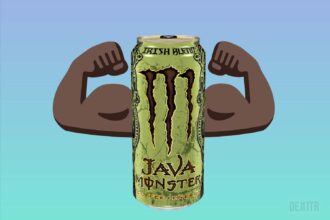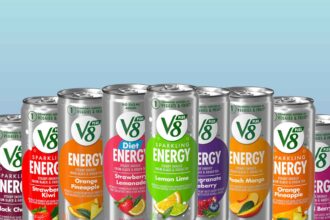Red Bull and coffee are two beverages that can improve your attention and concentration. That’s why they both may help you focus while studying, and thanks to them, you will be able to get more done quickly.
Key Takeaways:
Both Red Bull and coffee contain caffeine, the most widely energy-boosting and brain-stimulator used worldwide. Moreover, Redbull contains taurine, which improves cognitive function in your brain. Regardless of its source, caffeine is good for studying, because it improves brain function and alertness, as long as you get the dosage right.
According to a study from Harvard University, caffeine may boost performance during study sessions, including late-night ones. Many other studies have shown that caffeine is good for students since it improves memory, concentration, and reaction time, while also reducing mental fatigue.
Moreover, it has been demonstrated from research published by the journal Nature Neuroscience that caffeine after studying may help increase long-term memory and retention.
After finding the answer to all your questions in this article, please check out the article “Energy Drinks With & Without Taurine,” where we do an in-depth look at Taurine in energy drinks.
Recommended Resource:
One of the goals of our website is to demystify ingredients such as caffeine. We create fun-to-read, in-depth, and medically-backed topics that our users love. Here’s another super helpful resource when you’re done reading this article.
Is Coffee Good For Studying?
Coffee is a natural beverage, that has little to no additives or preservatives and almost no calories. It also contains healthy micro-nutrients such as vitamins B2 and B5, potassium, niacin, and magnesium.
Coffee can be strengthened, weakened, and sugared according to taste. This means it’s easier to control the taste, strength, and calories of your coffee drink.
Coffee may give you more benefits if you use it strategically. Here are some tips:
- Consider drinking it before important tasks, rather than habitually
- Drink no more than 4 cups a day (equivalent to 400mg of caffeine) – after that, researchers suggest the benefits drop off, and the side effects arise
- Caffeine can take up to 9 hours to clear from your body. Avoid drinking coffee several hours before bedtime.
- You may always need more coffee: reset your caffeine tolerance every once in a while, avoid coffee for 1 week, and then re-introducing it gradually.
Coffee: Pros and Cons
| Pros | Cons |
| Caffeine helps the brain stay focused | Can disrupt your sleep patterns |
| Contains natural antioxidants | You will always need more due to the phenomenon of tolerance |
| Almost calorie-free | Increase your blood pressure and heart rate |
| Lower risk of several types of cancer, as well as heart disease and heart-related death, due to the anti-oxidant content | |
| May protect against Alzheimer’s disease |
Is Red Bull Good For Studying?
Red Bull is okay for studying when consumed in moderation.
Red Bull is a sugar-sweetened, caffeinated drink marketed as an energy booster for the mind and body. However, the original Red Bull also has 27g of sugar per serving, which can dehydrate your body, cause a spike in blood sugar followed by a crash, and can cause weight gain.
Recommended Read:
Energy drinks can make you crash because they have hormone-level-boosting components like caffeine and sugar, which peak and fall off – resulting in a crash. I highly recommend reading my “Can Energy Drinks Make You Crash?“(6-minute read) article when you’re done reading this one.
While energy drinks do have vitamins, they also contain artificial colors, flavors, and preservatives. That’s why when consumed in larger amounts, they may cause negative side effects.
A double-blind study of 24 healthy volunteers published in the Journal of Psychopharmacology has shown that Red Bull had positive effects on memory performance in short and long-term memory. These effects occurred for information learned 30 to 90 minutes after the drink.
Interestingly, this was not seen with the sugar-free version of Red Bull, or the taste-matched placebo drink, so it means that sugar plays a relevant role in improving brain function.
Red Bull: Pros and Cons
| Pros | Cons |
| Caffeine and Taurine help the brain stay focused | It May dehydrate you since it’s loaded with sugar |
| Packs a significant amount of B vitamins | Short-term energy boost followed by a crash soon after |
| Side effects like anxiety and jitters | |
| Risk of developing Type 2 Diabetes | |
| Increases your blood pressure and heart rate |
Coffee vs. Red Bull: Which Is Better for Studying and Why?
Considering the amount of sugar and chemicals of Red Bull, and the natural healthy micro-nutrients of coffee, coffee certainly seems like a better choice for studying, especially in the long term. Besides being a healthier choice, coffee contains a bit more caffeine compared to Red Bull, so it is better for keeping you awake and focused more efficiently.
However, it’s ok to have Redbull sometimes, considering that it can be more convenient to drink quickly on the go.
You may choose your energy booster drink according to the situation:
- For a general boost of mental energy, coffee is better, due to the caffeine it contains and also because it’s easier to regulate the amount of sugar that goes into your drink.
- If you need a greater amount of supplements plus an energy boost, Red Bull is better, especially when you’re pulling an all-nighter study session.
Anyway, it’s really important to keep in mind some points:
- No beverage can act as a substitute for sleep. Research has proved that sleep deprivation has a negative impact on your mental performance and also impairs your ability to learn.
- If you stay awake drinking caffeine for studying, you just shouldn’t make a habit of it.
- In the long term, to achieve better studying performance, it’s essential to get a good balance and quality of sleep and food, together whit energy booster beverages containing the right dose of caffeine.
Whichever beverage you drink for studying, remember that caffeine, from coffee or Red Bull, should be consumed in small quantities. Make sure that you drink these beverages in moderation and incorporate good-quality sleep and a healthy diet.
Coffee vs. Red Bull: Which has more caffeine?
Coffee and Red Bull offer comparable amounts of caffeine per serving. However, coffee contains a little bit more caffeine compared to Red bull.
A cup of coffee may contain a very variable amount of caffeine, from 90 mg to 120mg, while a can of Red Bull contains 75-80mg of caffeine per 4-ounce (248-mL) can. That said, the amount of caffeine in a cup of coffee is affected by several factors, including the coffee bean, the roasting style, how is prepared, and the serving size (for instance, a grande cup in Starbucks contains up to 225 mg of caffeine).
What Is the Recommended Daily Amount of Caffeine?
The U.S. Food and Drug Administration considers 400 milligrams a safe amount of caffeine for healthy adults to consume daily, and 200-300 mg for pregnant women. This amount is equivalent to 4 cups of coffee (or 945 mL) or 5 regular cans (42 ounces or 1.2 liters) of Red Bull.
Most energy drinks and most of the coffee drinks we can find contain less than half of the daily recommended limit of 400mg, making them reasonably safe.
Ingredients, their roles, and their effects
This is a chart of comparison between Coffee and Red Bull in terms of nutrition facts. It’s important to note that the nutritional values of coffee are harder to estimate because they depend on the brew and the additional ingredients added to the coffee drink.
The daily calorie intake of adults may vary from 1,800 calories to 2,600 approx. Red Bull contains 110 calories, while coffee only has two calories unless there are added milk and sugar or other add-ins (for instance, a flavored latte can contain up to 140 calories). In both cases, it is a reasonable amount of calories.
According to AHA, the added sugar limit should be no more than 24 to 36 grams of sugar. Red Bull contains 27 grams of sugar, which is more than the recommended limit. Red Bull has a sugar-free version, that also contains more caffeine.
Red Bull contains five types of vitamins (B1, B2, B3, B6, and B12), while coffee only contains two (B2 and B3).
| Nutritional Value / Ingredient | Benefits | Side Effects | Black Coffee | Redbull |
| Sugar | – Boosts instant energy – Improves moods | – High Blood Sugar – High Blood Pressure – Acne – Fatigue and low energy levels – Craving for sweets – Increased risk of Type 2 Diabetes – Increased risk of Heart Problems – Weight gain | 0 gr | 27 gr |
| Caffeine | – Improves memory – Decreases fatigue – Boosts mental functioning – Faster reaction times | – Anxiety – Jitters – Confusion – Dehydration – Panic attacks – Diarrhea – Headaches – Gastrointestinal – Insomnia – Irritability – Heart palpitations | 95 – 120 mg | 80 mg |
| Calories | The body needs a certain amount of calories to survive and produce energy | Excess or deficiency of calories may lead to imbalanced weight and other health problems | 0 – 3 calories | 110 calories |
| Protein | Proteins are essential in the body to build tissue and muscles and to allow metabolic reactions | Excess or deficiency of protein may lead to increased fat, fatigue, and other health problems | 0 gr | 1 gr |
| Taurine | – boost metabolism – improve performance – protect heart and eyes | – nausea – dizziness – headache – diarrhea or constipation – difficulty walking | 0 gr | 1 gr |
| Magnesium | – Boosts exercise performance – Improves mood – Helps keep blood pressure and heartbeat normal Promotes healthy bones | 2% of the DV (daily value) | 12% of the DV (daily value) | |
| Potassium | – Regulates heartbeat – Promotes the proper function of muscles and nerves | 3% of the DV | 0 | |
| Riboflavin (B2) | – Fights free radicals – Promotes healthy vision and skin – Aids in the production of red blood cells | 11% of the DV | 21% of the DV | |
| Thiamine (B1) | – Aids appetite regulation – Boosts energy – Helps fat digestion | 0 | 9% of the DV | |
| Niacin (B3) | – Promotes healthy skin and muscles – Promotes mental acuteness | 2% of the DV | 160% of the DV | |
| Vitamin B6 | Participates in the creation of serotonin | 0 | 331% of the DV | |
| Vitamin B12 | – Boosts energy – Promotes emotional stability – Aids in the production of red blood cells | 0 | 213% of the DV |
What Are Some Alternative Beverages for Studying?
Drinks that contain antioxidants, probiotics, or brain-boosting food, such as berries, nuts, cocoa, or avocado, may improve focus, performance, and memory.
The compounds found in those drinks are called “nootropic” or “smart drugs”. A nootropic drink is a healthy natural beverage that will support your brain functioning. Even coffee is considered a nootropic beverage.
There are many brain-boosting beverages, alternatives to coffee and Red Bull, that are good for study. Here are some:
- Green Tea: Full of antioxidants, improves brain function, protects the brain from aging
- Kombucha: Fermented drink made from tea, contains probiotics that improve your gut health
- Kefir: Made from fermented milk, promotes the growth of healthy bacteria in your gut
- Orange Juice: Rich in vitamin C, offers neuroprotection
- Blueberry Juice: Provides lots of antioxidants, is good for your skin, and improves memory
- Beetroot Juice: Rich in nitrates, promotes cell oxygenation and improves blood flow
- Green smoothies: They can be made with a variety of green fruits and veggies (such as apples, cucumber, lemongrass, kale, spinach, celery, limes, and avocado…), and they are rich in vitamin C and antioxidants
- Golden milk: made with vegetal milk and turmeric, it contains antioxidants and boosts brain function
- Herbal tea with nootropic herbs that support brain function, like ginkgo Biloba, ashwagandha, ginseng, Rhodiola, and sage.
8 Ways to Develop Better Study Habits Without Caffeine
Many factors can help you enhance your mental performance, apart from energy boost drinks:
- Have a good night’s sleep. Not getting enough sleep can have a negative impact on your memory and impair your ability to retain new information.
- Drink a lot of water. Dehydration is an energy suck since the human body is 60% water. Fatigue is a common sign of dehydration, so be sure to drink at least 6-8 glasses of water throughout the day.
- Eat healthy meals and snacks regularly throughout the day. It is essential to keep blood sugar levels steady. Large meals or low blood sugar can make you feel foggy and mentally lethargic. So, look for foods that have a low sugar index, as they are absorbed more slowly and won’t lead to a drop in the energy level.
- Breathe deeply. Deep breathing decreases stress and anxiety and boosts productivity. You can practice deep belly breathing or other breathing techniques.
- Get moving. Even a quick walk in the sunshine is a great way to re-energize and make your endorphins flow. Moreover, it has been proved that exposure to blue light during the day (light from natural sources like the sun and artificial sources such as laptops and LED lighting) improves alertness and performance. Bright light also activates the hypothalamus, which controls our circadian rhythms and mood.
- Look away from the screen. 95% of Americans are at risk for so-called computer vision syndrome which causes eye irritation and dryness, eye strain, blurred or double vision, headache, and shoulder and neck pain.
- Take a nap. A 5 to 20 minutes nap is a great way to recharge. A study realized in 2008 has found that an afternoon nap is good for memory consolidation, and it has shown to be better than both getting more sleep at night and using caffeine. Another study has shown that even quick six-minute naps help people retain information better.
- Listen to music. Studies have found that music can help keep mental alertness. Also, listening to music can make your brain release multiple feel-good chemicals that can energize you.
Conclusions
While studying, a lot of mental and physical energy is consumed. The caffeine contained in energy drinks and coffee can help boost your focus during a long study session.
That’s why coffee and Red Bull are great energy boosters for this purpose. They have similar levels of caffeine, but they are significantly different in nutrients.
Drinking a Red Bull responsibly, once in a while, is good to get through a study session. However, in the long term, it’s not a great solution, because it may have a negative impact on your health and even decrease your mental performance, due to the high amount of sugar and synthetic additives.
Due to its antioxidants and very low-calorie count, coffee it’s a preferable choice. It contains a bit more caffeine, so it will keep you alert and help study for a longer time when compared to Red Bull.
Whereas you prefer coffee or Red Bull, it’s essential to keep in mind that the recommended maximum daily amount of caffeine is 400 mg. Also, remember that there are many brain-boosting drinks and food and many healthy habits you can adopt that will enhance your studying performance.
Photo altered by dejittr.com | Photo attribution: Elijah Hail













